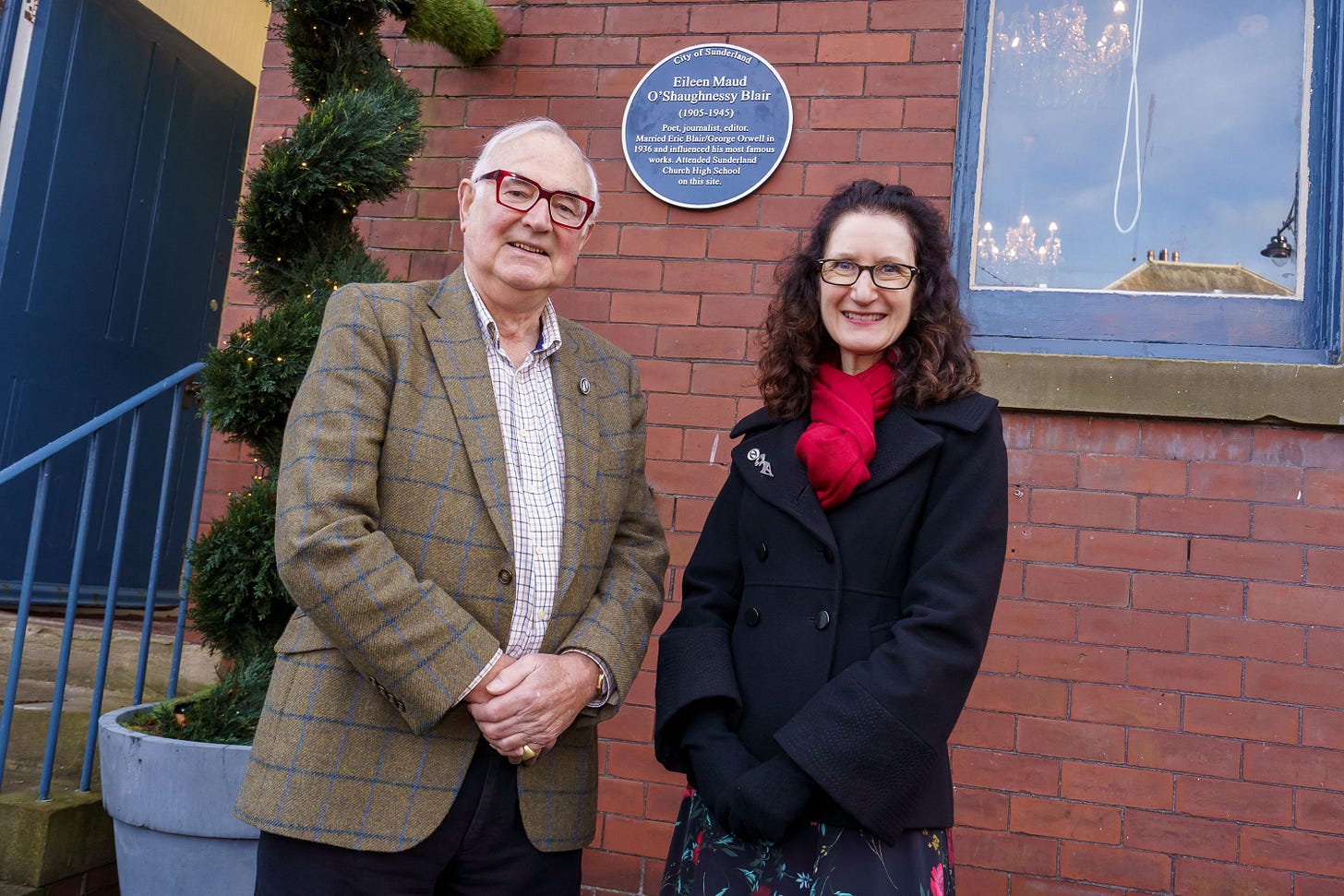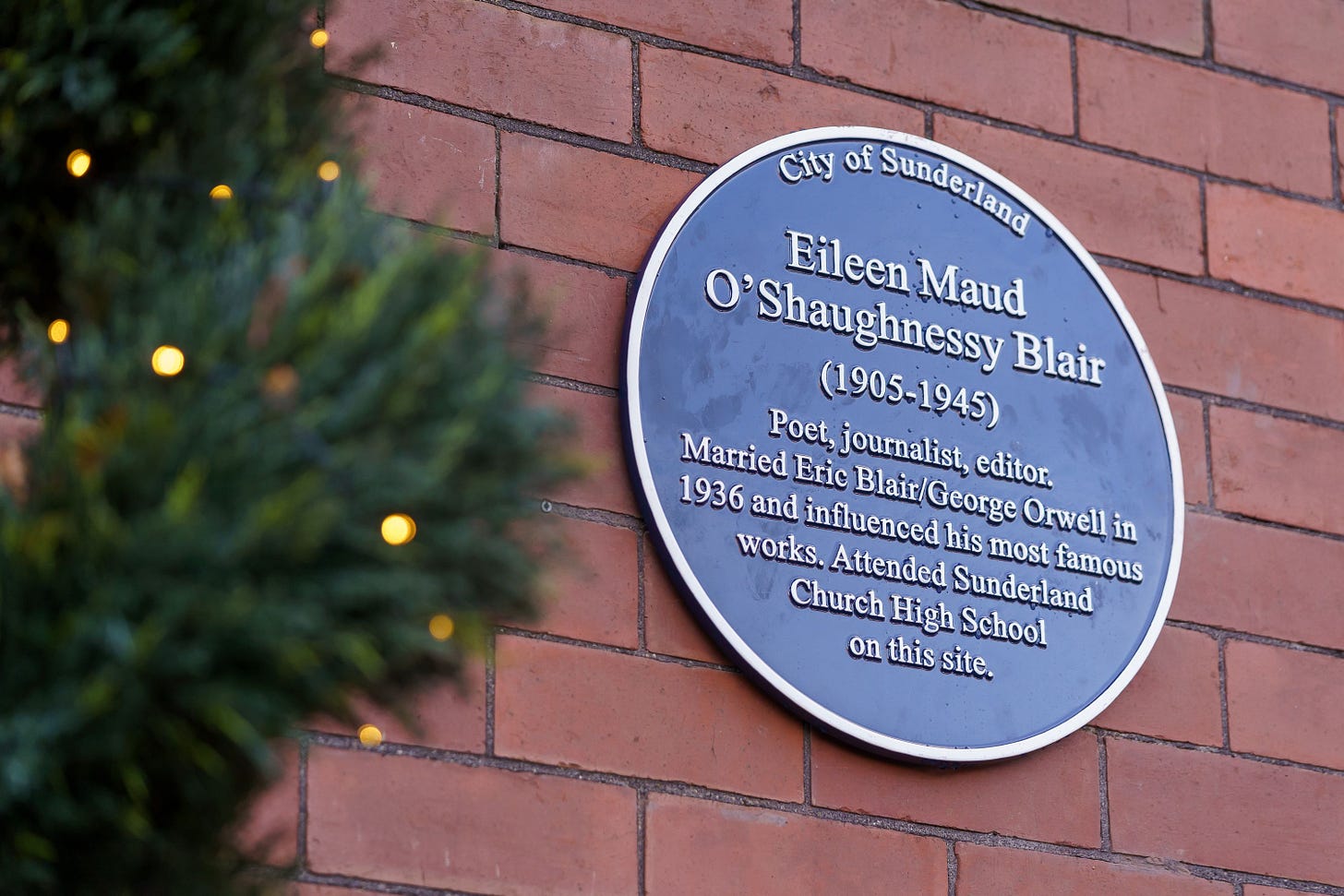Remembering Eileen: an interview with George Orwell's son, Richard Blair
Eileen Maud O'Shaughnessy Blair (1905 - 1945)
Last month a blue plaque was unveiled in Sunderland, where Eileen O’Shaughnessy went to school. Eileen O’Shaughnessy, born in South Shields on September 25, 1905, met Eric Blair - better known by his pen name George Orwell - in 1935, while she was studying educational psychology at University College London and Blair was a struggling writer. The couple married a year later in Wallington, Hertfordshire.
As well as being a writer in her own right, Eileen is increasingly recognised as having had a strong influence on her husband’s writing, particularly in Animal Farm. She died under operation in 1945, shortly before the book’s publication. In 2020, she was the subject of a new biography by Sylvia Topp, Eileen: The Making of George Orwell.
After the unveiling, Richard Blair spoke to Gilly Hope on BBC Radio Newcastle about his memories of his mother. You can read an edited transcript below, or listen to the interview on BBC sounds (begins 1hr 33).
The new plaque was organised by Professor Angela Smith, who leads Sunderland University's SunGen Interdisciplinary Research Network. Richard Blair, the adopted son of George and Eileen, unveiled the plaque at Langham Tower, which formed part of Eileen’s former school, Sunderland Church High School.
Professor Smith said: "The blue plaque marking Eileen O'Shaughnessy's connection with Sunderland will allow us to think more about the people who have done remarkable things and yet have not thus far been celebrated.”
GH – My guest at the moment is Richard Blair. His mum was called Eileen O’Shaughnessy, and she married George Orwell in the 1930s. Now there’s a blue plaque that’s been unveiled in Sunderland where Eileen went to school. We had a chat about this tribute to his mum who died – she was only 39 years old when she passed away, and Richard was just a baby.
RB – “Yes, so I was only 10 months old – she died in March of 1945. I think it was of cancer of the womb, but she had been ill all during the war. My father and she lived in fairly uncomfortable conditions in London - but she did have problems, and when he went to Germany she decided that she would come up to this part of the world, back to Greystone, which was the family home for another member of our family, so that she would go into hospital and have an operation - a hysterectomy. Sadly, when she was put under the anaesthetic she immediately had a heart attack and died.”
GH – So the memories that you have from your mum are almost stories that have been passed down, from her family and from your dad. What do you know about her younger years here? Because she was born in Shields, wasn’t she?
RB – “Born in South Shields. In fact, the odd thing about the Blair family is that you never talked about the past. So what I know is what I’ve gleaned over the decades, and what I’ve had to read. My father’s younger sister Avril, who became my legal guardian, never talked about things of the past. She never talked about my adoptive mother, she never talked much about my father. So it was what I had to read, essentially. We weren’t an odd family, but we weren’t a huggy-kissy family.”
GH – That was of the time, wasn’t it? People didn’t share their feelings perhaps as we do now.
RB – “You kept it to yourself. So that’s the way I was brought up. It was going to school that I slowly started to absorb the fact of who my father was, and then later on who my mother was. And of course it’s only in the last few years that it’s really accelerated. And the fact that the importance of my mother is now coming to the surface, because she was very important; she was very important to my father. Without her he would not have written some of the stuff, especially Animal Farm. When he was writing Animal Farm they would sit up in bed and he would read her a chapter or a piece, and she would listen, and she would give her advice from a woman’s point of view how the animals might react. I think that’s why when you read Animal Farm it’s quite different to when you read any of the other books – it’s her influence. Some people say ‘oh well of course he was just improving his style’, but Animal Farm is quite different and it’s a fabulous little tale.”
GH – Do you think it’s because your mum – she majored in psychology, didn’t she? So there was that aspect to her.
RB – “She was a deep thinker, and I think she had the measure of my father. In spite of the fact that he said, when they were living together, ‘well I must get away, I’ve got work to do’, and just left her to feed the animals, do the cooking, look after the vegetables, that sort of thing. In that sense she was devoted to him. But she also had an independent mind, and she knew her mind, and I think she used it on my father without him realising.”
GH – Well she sounds a formidable woman. It's been a great honour to meet you and to hear just a little bit of her life. Thank you very much.




If anyone would like to know more about Eileen O'Shaughnessy Blair (George Orwell's wife and Richard Blair's mother), please read my biography of her, called Eileen: The Making of George Orwell.
Thanks!
Sylvia Topp
I would like to read your book; so often we'll known make writers have been inspired, emotionally supported by their wife or female partner eg James Joyce and Norah Barnacle ( wonderful name) and also about F Scott Fitzgerald's cruel treatment if his wife who apparently was a superb writer.